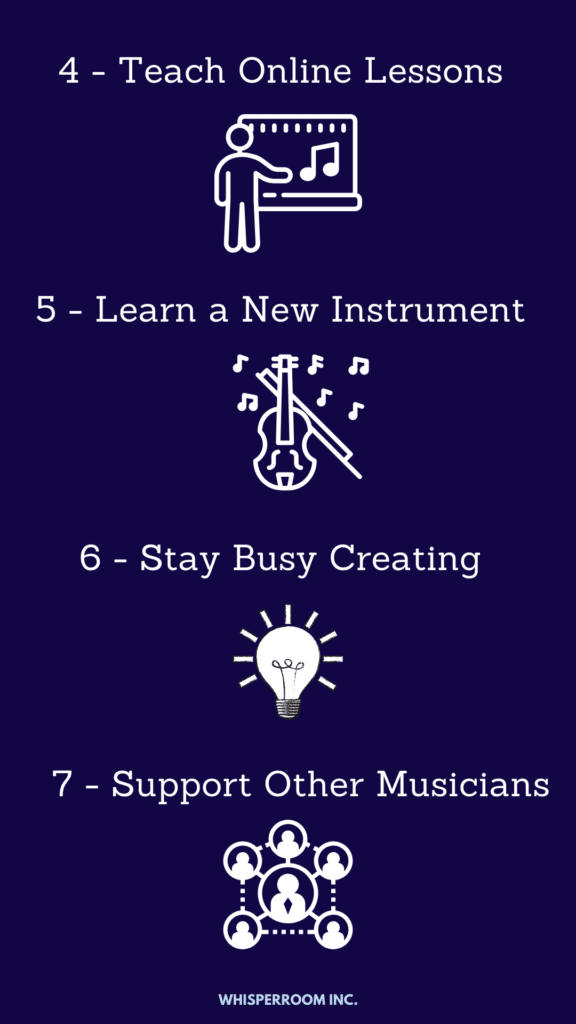WhisperRoom™ is a proud sponsor of the podcast Recording Studio Rockstars. In each episode, Lij Shaw interviews music producers, engineers, studio owners, and other professionals to bring you inspiring stories, tricks, and insight from the recording industry.
You can listen to the entire podcast archive of Recording Studio Rockstars here or from your favorite podcast app.
RSR Episode #239: Grant Walden Talks All About Recording Legendary Muscle Shoals Musicians
In Episode #239 of Recording Studio Rockstars, Grant Walden talks about recording at HearTell Studios in Muscle Shoals, recording tips for bass guitar, Nashville Numbers chart writing, and lessons learned from mentors like Dave Pensado and Craig Alvin. Plus a lot more.
Listen to the full episode here or stream it in the video below!
Who is Grant Walden?
Grant is a music producer, audio engineer, multi-instrumentalist, singer, songwriter, studio owner, and host of Tape Noise Podcasts. Grant has worked with Grammy-winning studio musicians, audio engineers, and recording artists. Including, Denny Laine of The Moody Blues and Wings, Jimmy Hall of Wet Willie and Jeff Beck Band, Christine Ohlman of the Saturday Night Live Band, Rock & Roll Hall of Fame member Spooner Oldham, the legendary Muscle Shoals Rhythm Section the Swampers, Hanson, and a host of groundbreaking performing artists.
He has also been mentored by notable engineers and producers Dave Pensado, Jim Gaines, Toby Wright, Craig Alvin, and Jerry Masters. His latest projects include records by Jimbo Mathus of the Squirrel Nut Zippers, Invisible Teardrops, Sailour, and Eddie Martin.
Grant also owns HearTell Studios and Publishing based in Studio C at Cypress Moon in Sheffield, AL — formerly the home of Muscle Shoals Sound II, where legendary artists like Bob Dylan, Bob Seger, and Julian Lennon have all recorded.
Improve Your Guitar Skills During LockdownThis is one of the most memorable chapters of our lives as our world and all of the humankind experience the crisis.
While we help our countries restrain the spread by staying in our homes, many are left with nothing to do. It feels like the boredom has made us unproductive, but what if we create a meaningful use from the free time that we have? We could emerge as a better and more smoothed guitarist after the lockdown.
Yes, you read it right. Let’s dedicate this lockdown time to improve your guitar skills.
Any guitarist who takes their ability earnestly – be they broad beginners, experts of their craft, or whatever in between – needs to spend time with their instrument. You will not be an expert guitar player without the longing and determination to be one. There are no rapid solutions here.
In this article, we’re going to look at the proper ways to improve your guitar skills during the lockdown.
1. Commit Your Precious Time
Take hold of whatever guitar that might be lying around your house. Pick it up and play whenever it’s convenient. Time is still precious, so use it wisely.
It’s important that you willingly dedicate practice time when trying to advance your guitar playing. It’s not sufficient to strum out accidental tunes while watching television; you must put an emphasis on your playing.
For starters, try to regularly reserve some time to concentrate on playing the guitar. It only takes a few minutes of your day to work on a new skill. As you learn more stuff to play, you’ll find yourself playing for longer a duration of time. You might even lose track of time completely.
2. Set SMART Goals
Most people who don’t grasp their goals fail to attain success because they never set “SMART” goals. SMART goals are very important to help you learn guitar in the most convenient and most effective way you could.
You need to be SPECIFIC about what you’re trying to learn, you must know how to make your guitar goals MEASURABLE and know the steps to make them ACTIONABLE. Do not let your goals remain as goals, therefore they need to be REALISTIC and learn to be more conscious about the attention you put into them. Additionally, you need to be TIME SENSITIVE by setting obtainable deadlines that fit your skill level. The firmest way to become a great guitar player is to set SMART goals and stick to them.
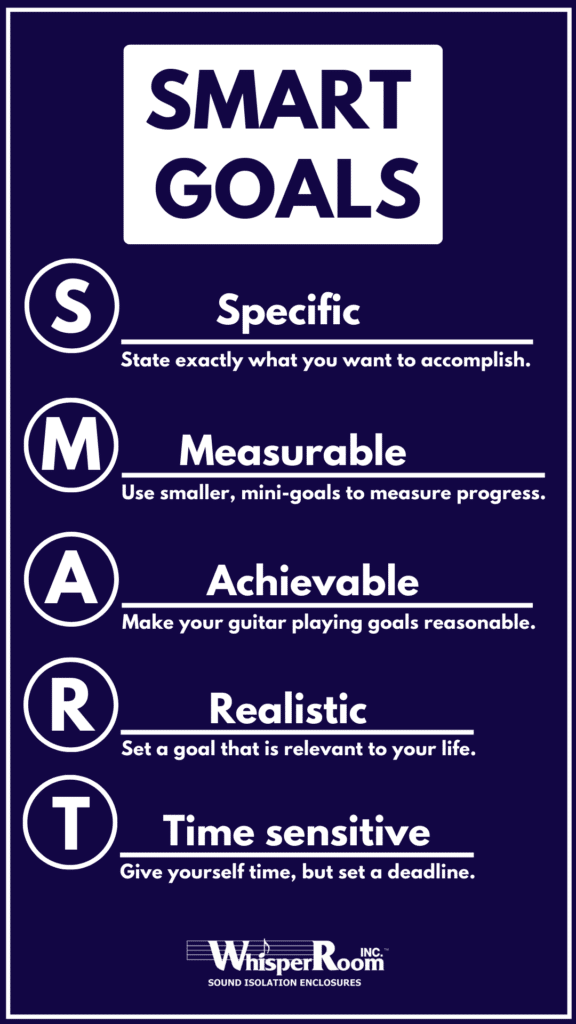
3. Check Out Online Tutorials
Whether it’s finally getting around to entering an online soloing competition, or participating in some of the many online open-mics and songwriting sessions that are springing up, it’s this sense of community, shared experience, and real-world outlets that will breathe new life into your music in difficult times!
4. Explore New Styles
Experimentation has always been one of the best ways to learn something new. The more you stray from your main styles – the better. This is all about acquiring something fresh, challenging yourself, and marching away from your comfort zone. Eventually, you’ll be a better-rounded musician.
If jazz is your thing, then you must also try death metal. If you’re a shredder, give minimalist rhythm guitar playing a whirl. Just study something new!
5. Play Along With Songs You Know
Playing along with songs that you already know is one of the best ways to learn new chords and get a sense of playing with a band. It’s even better if you pick a favorite tune or a legendary guitar riff that you’ve been wanting to learn for years. This will make you feel more intrigued to learn and play more often. Hence, playing favorite songs will make you fall in love with guitar playing even more.
So set up your playlist, pick the ones you could play or practice and you’ll have a great time with your instrument.
6. Try a New Tuning
This one can unravel a vast quantity of creativity. All the arrangements and hand positions you know or dwell-in might vanish, sending you to use your ear and your disposition to play your guitar. Alternate tunings will help improve your guitar skills by giving a completely new perspective on riffs, licks, chords, and scales. This will intrigue you to play in all sorts of new styles that will help you reach a variety of new musical characteristics. You may even create an original sound or your own unique style in a new tuning.
7. Practice Your Chord Changes
Clearly, it’s essential to give attention to your strumming technique and chord changes. Being clever to quickly modify and change chords across the neck is necessary to make you become a good guitar player. It helps you establish a more complicated task which will help you ascend to a different level of expertise.
If you reach a point where you can effortlessly move among all the chords you know without an issue, add more chords to further intrigue your arsenal. There are always more chords to learn.
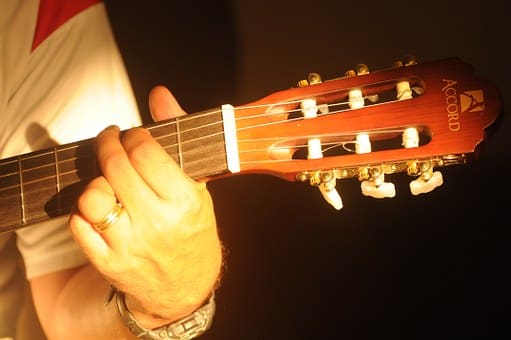
8. Practice Without Headphones
Often, you can hear more precise sounds when playing with headphones on and they’re especially helpful when you’re starting to learn how to play guitar. However, you must also consider practicing the guitar without headphones.
There are instants when inspiring sound can stimulate or produce great ideas and times when you need to block out the world to carry forth something which is concealed. In times of playing quietly with headphones on or with the amplifier cranked up, we give ourselves the chance to adapt to the inconsistent set up of the world. This will help you become more versatile.
9. Write It Down and Chart Your Progress
Track your progress to stay inspired to continue the music lessons that you have engaged yourself in. To achieve this drive of interest, you need to actually write down the chords you learn for repetitive rehearsals until you learn to master it. Also, it helps to jot down new chords and songs you want to learn to help you have a gradual plan for increasing your skill level.
Final Thoughts
It is not a one-time process to improve your guitar skills. Some of us learn quickly and for others, it takes a little more time. Have fun and try not to get frustrated when you get stuck. Little by little you’re playing will get better as you navigate these uncertain times.
In order to learn guitar, there is a need for dedication, a love for music, and an inclination towards how music helps you. Therefore, it is necessary to understand that playing music helps you detoxify and allows you to find a remedy during this lockdown struggle.
Music is everywhere. Sometimes you hear it somewhere unexpected, and sometimes, you make it yourself. And that’s more substantial.
RSR: Richard Dodd’s Grammy-Winning Mixing TipsWhisperRoom™ is a proud sponsor of the podcast Recording Studio Rockstars. In each episode, Lij Shaw interviews music producers, engineers, studio owners, and other professionals to bring you inspiring stories, tricks, and insight from the recording industry.
You can listen to the entire podcast archive of Recording Studio Rockstars here or from your favorite podcast app.
RSR: Episode #238: Grammy-Winning Mixing Tips from Richard Dodd
In Episode #238 of Recording Studio Rockstars, Richard Dodd talks about mixing, how to get the most out of fewer drum mics, getting a killer bass sound, Mike Cambell’s guitar amp microphone trick, and the power of mixing in mono. Plus, he shares a ton of cool insight into the art of mixing.
Listen to the full episode here or stream it in the video below!
Who is Richard Dodd?
Richard Dodd is a multi-platinum Grammy-winning producer, recording engineer, and mastering engineer with 40 years of amazing credits to his discography.
Richard began recording hits in the 1970’s like “Kung Fu Fighting”, and has since distinguished himself many times over. He’s known for his with artists Boz Scaggs, Stephane Grappelli, George Harrison, Wilco, Green Day, Robert Plant, Roger Daltry, the Traveling Wilburys, Tom Petty & The Heartbreakers, Freddie Mercury, and many more.
Career Highlights
In 1995, Dodd won the Best Engineer Grammy Award for Tom Petty’s “Wildflowers“. Additionally, he was awarded Best Blues Album in 2001 for “Nothing Personal” by Delbert McClinton, and multiple Grammys in 2007 for the Dixie Chicks “Taking the Long Way“. He also mastered all of Jason Aldean’s Platinum albums plus 13 of Jason’s #1 Hit singles.
More about Richard
Richard was previously on Recording Studio Rockstars for Episode #096. Give it a listen if you’d like to hear more about his background story.
Check out some of the music Richard Dodd has worked on below!
WhisperRoom™ is a proud sponsor of the podcast Recording Studio Rockstars. In each episode, Lij Shaw interviews music producers, engineers, studio owners, and other professionals to bring you inspiring stories, tricks, and insight from the recording industry.
You can listen to the entire podcast archive of Recording Studio Rockstars here or from your favorite podcast app.
RSR Episode #237: Awesome Mixing Tricks from F. Reid Shippen
In Episode #237 of Recording Studio Rockstars, F. Reid Shippen talks about many cool tricks to try on your next mix. Including a long list of favorite plugins, how to start and finish a mix, how to get killer drums, bass, guitars, and vocals, plus much more!
Listen to the full episode here or stream it in the video below!
Who is F. Reid Shippen?
Episode #237’s guest is F. Reid Shippen, a multiple Grammy Award-winning mixer, engineer, and record producer. His credits include 10 Grammy Award-winning albums and over 100 #1 singles.
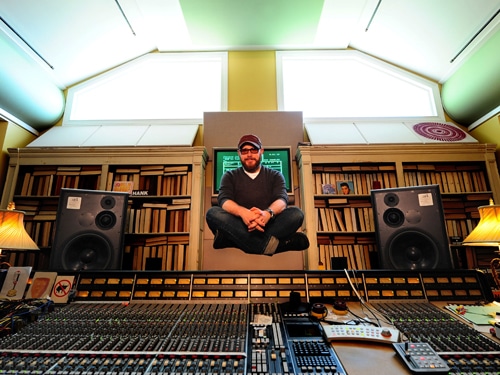
His years of experience as a recording and mix engineer span multiple genres. Featuring a wide-range of artists such as Ingrid Michaelson, Kenny Chesney, India.Arie, Cage the Elephant, Little Big Town, CeCe Winans, Steven Tyler, Colony House, Lucie Silvas, and Dierks Bentley.
In 2019, Shippen received the Academy of Country Music award for Audio Engineer of the Year. Previous to that, he served as co-chair of the Producers & Engineers Wing of NARAS. He currently serves as the Chief Creative Officer for the music production house, The Music Playground.
An advocate for music education, F. Reid Shippen co-teaches a class at Middle Tennessee State University. He also co-founded SongFarm.org, an organization that gives kids equal access to creativity by building free recording studios in underprivileged high schools nationwide.
Shippen currently works out of his private Robot Lemon studio, located in the Green Hills area of Nashville.
7 Ways Musicians Can Navigate COVID-19The coronavirus outbreak has created many problems around the globe. The pandemic has impacted numerous industries, but small businesses, self-employed workers, and musicians are especially hurting.
As the majority of the population is staying home due to COVID-19, establishments are losing customers and having a difficult time paying bills. Musicians and bands have been forced to cancel tours, stop playing shows, and adapt to a new way of reaching fans.
Unexpectedly, many musicians have a lot more free time on their hands as a result of the crisis. However, there are new ways to reach fans, grow your audience, and connect with crowds. This article will offer several tips on how musicians can navigate COVID-19.
1. Live Stream Your Events
Playing live on the internet is one of the most practical things to do during this time. Bands, musicians, DJs, producers, and engineers have the opportunity to host virtual performances for their fans. Even gigging musicians who typically play cover songs at bars and restaurants can take advantage of this new way to perform.
Facebook Live, Instagram, YouTube, and other social media platforms make it super easy to get creative with your online events. After choosing a platform, simply add a PayPal.me link to your bio or description to start collecting virtual tips from your online audience. To make this work really well, personalize your performance and connect with your viewers.
This is your chance to let your fans get a glimpse of your creative process, workflow, and lifestyle. Make sure to stay engaged with your viewers by answering questions and telling stories that let your personality and music shine.
2. Sell Your Merch Online
Musicians know that merchandise sales provide substantially more income than Spotify streams. This is a great time to update the online shop on your website.
Artists should put an emphasis on selling their CDs, vinyl, shirts, hats, and posters during this time. Maybe consider putting together a package of your best-sellers or create an online fan club where exclusive items are sold.
3. Work in the Studio Remotely
Most musicians have some sort of studio in their home and now is a great time to put it to work. You can perform session work or collaborate on a track with another artist. Most engineers can still provide mixing and mastering services and producers might find some luck in selling beats and custom sample packs.
If you’re an audio wizard, you may want to consider offering online tutorials or lessons for Protools, Logic, or Ableton. Novice engineers and musicians who self-record will have much more time to learn your secret expert tips.
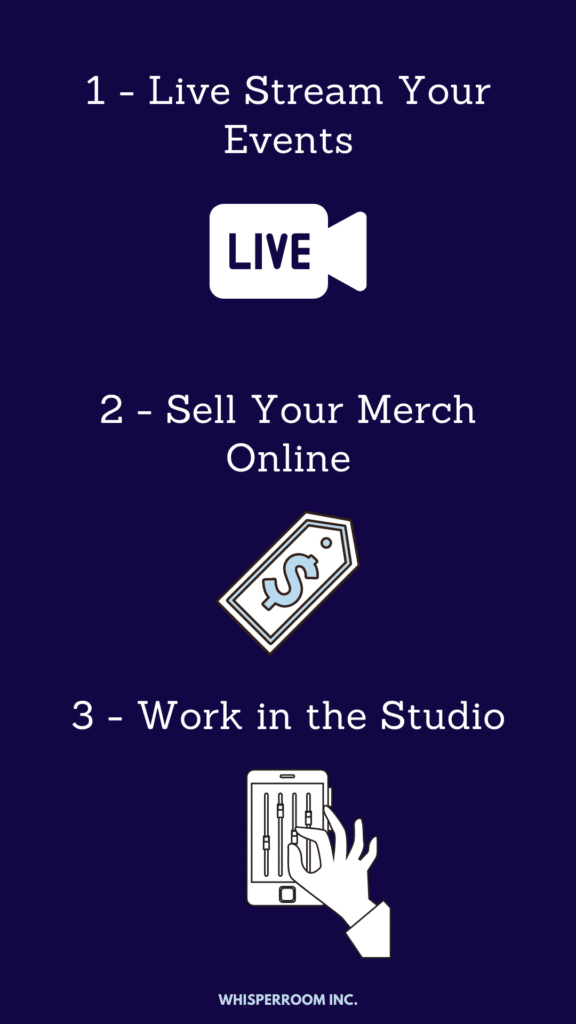
4. Teach Online Music Lessons
Zoom, Skype, and Facetime have made interactive music lessons easy. Everyone has more time to practice and your fans would likely jump at the opportunity to learn your favorite techniques, unique methods, and even your music!
If you’re an audio wizard, you may want to consider offering online tutorials and lessons for Protools, Logic, or Ableton. Novice engineers and musicians who self-record know lots of secrets. Now would be a great time to leverage your expertise and teach other musicians how to efficiently mix a drumset or master a song. Your knowledge can help other musicians navigate COVID-19 too.
Musicians everywhere have always enjoyed the side hustle of teaching music lessons. You might even be able to provide a great source of additional income to help you have a good part-time job when things return back to normal.
5. Learn a New Instrument
Many songwriters and musicians are multi-instrumentalists. Chances are, you have several different instruments in your house or apartment. Don’t hesitate to learn something new. Now is a great time to polish your skills on the guitar, train your ear, or spend more time playing the piano.
Do things differently. You could try writing a song on a new instrument or learn all the parts of your favorite songs. The possibilities are endless when you learn a new instrument.
6. Stay Busy Creating
During this time, many musicians will stay busy writing songs and recording new material. It’s also a good time to work on the stuff that’s been put on pause. Maybe you’ve been procrastinating on a project. Perhaps, you need to make artwork for a new EP or you want to master an album for vinyl. You will have more time to catch up on the things that have been on hold.
It’s healthy to stay busy creating new things. When life gets busy again, you’ll be thankful that you spent your time being productive.
7. Support Other Musicians
You should always support other musicians, but now is a crucial time to step up and support your local scene. Remember, every musician around the world is affected by the current state of affairs.
You can show support by purchasing albums on Bandcamp or ordering a t-shirt from one of your favorite bands. Fans will grow, networks will be strengthened, and the iconic music that’s released during this time will be remembered. We’re all in this together.
